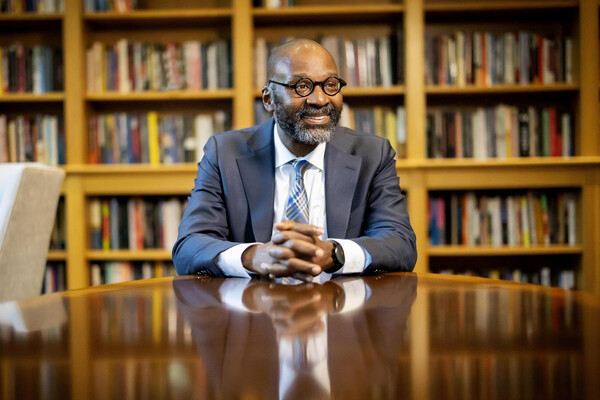
Griffin Pitt, right, works with two other student researchers to test the conductivity, total dissolved solids, salinity, and temperature of water below a sand dam in Kenya.
(Image: Courtesy of Griffin Pitt)
PHILADELPHIA — United Nations Secretary-General Ban Ki-moon will open the fifth annual meeting of the Global Colloquium of University Presidents on Monday, April 4, in a public address at the University of Pennsylvania on empowering women.
The Colloquium, a select group of 29 university presidents from around the world, convened annually to discuss a topic of immediate concern to the secretary-general, will address the challenge of “Empowering Women to Change the World: What the UN and Universities Can Do” on April 4-5.
In addition to the secretary-general, Michelle Bachelet, former president of Chile, under secretary-general of the United Nations and executive director of U.N. Women, and Valerie Jarrett, senior advisor to President Obama and chair of the White House Council on Women and Girls, will participate in the Colloquium.
Ban Ki-moon has prioritized empowerment of women and gender equity.
“Only through women’s full and equal participation in all areas of public and private life can we hope to achieve the sustainable, peaceful and just society promised in the United Nations Charter,” he said on International Women’s Day in March. “Universities can help in this effort by nurturing their own role models and enabling women’s empowerment through all their research, outreach and appointments.”
Penn President Amy Gutmann helped found the Colloquium in 2004 along with fellow university presidents from Columbia, New York University, Princeton and Yale in response to the secretary-general’s request for greater involvement of the global academic community in exploring international public policy concerns.
“The world will realize its full potential only when we address gender inequality and empower women,” Gutmann said. “Universities have an important role to play in empowering women through education, research and community service and in serving as institutional exemplars of gender equality, diversity and inclusive participation in leadership. We also look forward to exploring the possibilities of collaborating with the mission of UN Women.”
The U.N. General Assembly created U.N. Women in 2010 to pull together the United Nations’ many activities in support of women and girls. The secretary-general named Bachelet under-secretary-general and the first executive director of the newly created entity in September 2010.
Valerie Jarrett will also address the Colloquium.
“In a wide variety of areas, President Obama is committed to empowering the world’s women,” she said. “I’m looking forward to speaking with the Global Colloquium about his commitment, sharing ideas and working together to realize our common dream of a world where all things are possible for all women.”
As university host of this year’s Colloquium, Gutmann is joined by academic partners Deborah A. Driscoll, professor and chair of Penn’s Department of Obstetrics and Gynecology, and Afaf Meleis, Margaret Bond Simon Dean of Nursing and professor of nursing and sociology at Penn.
Penn will welcome the 29 presidents and their faculty partners from research universities in Asia, Africa, the Middle East, Latin America, Europe and North America. A full list is available at www.upenn.edu/president/global_colloquium/participating-universities.
During the Colloquium, the presidents will discuss the best ways for universities to address the empowerment of women and gender equity and to identify additional steps universities can take in their home countries to further these goals.
The faculty experts on women’s issues and international affairs will consider what more the United Nations can do to advance women and girls around the world.
Key areas of discussion will include educational access and equity, creating paths and pipelines to leadership roles for women, empirical research on the myriad social and cultural factors that perpetuate women’s inequality and access to health care for women and girl.
Previous Colloquia have addressed such important topics as academic freedom, international migration, innovative sources of funding global goods, the social benefits of the research university in the 21st century, sustainability and global climate change and the role of science in meeting global challenges. A full list is available at www.upenn.edu/president/global_colloquium/previous
Ban Ki-moon’s address is open to the media and will be held at 5 p.m. in Irvine Auditorium, at 3401 Spruce St.
Members of the media must RSVP to Laura Cavender at cavender@upenn.edu.
All other sessions are closed, but participants will issue a report on the proceedings later this year.
More information on the Colloquium is available at www.upenn.edu/president/global_colloquium/home.
Laura Cavender , Vannina Maestracci

Griffin Pitt, right, works with two other student researchers to test the conductivity, total dissolved solids, salinity, and temperature of water below a sand dam in Kenya.
(Image: Courtesy of Griffin Pitt)

Image: Andriy Onufriyenko via Getty Images

nocred

Provost John L. Jackson Jr.
nocred